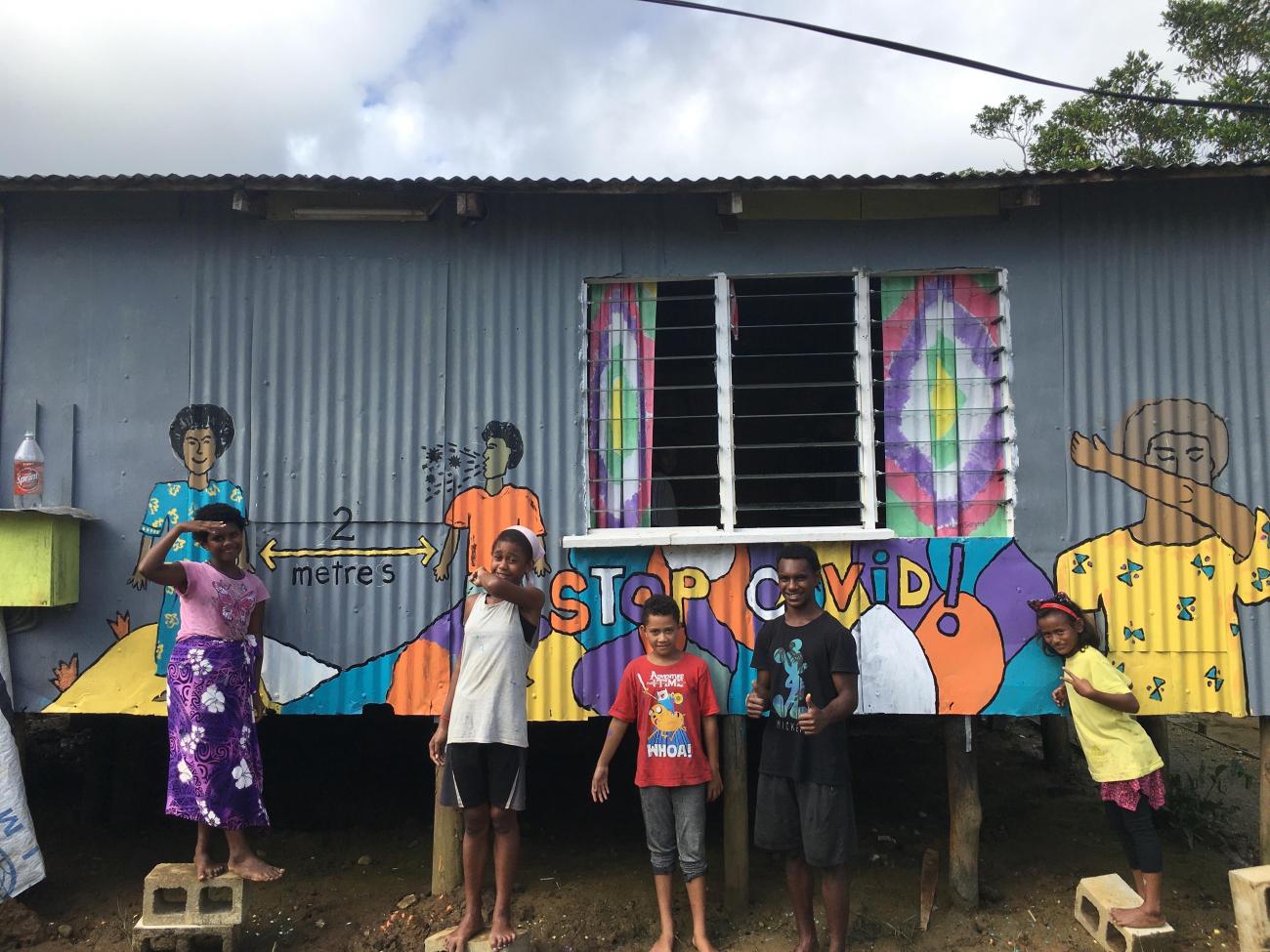Engaging the Youth of the Pacific: Young artists paint a way to COVID-19 safety

Colourful murals have been used to deliver life-saving messages on COVID-19 in some of Fiji’s poorest communities.
Colourful murals have been used to deliver life-saving messages on COVID-19 in some of Fiji’s poorest communities. Young community members, along with local artists, used their painting skills to create vivid images that have delivered simple yet powerful messages on how to stay safe from the virus.
The initiative was developed by the Fijian Government, with support from UN-Habitat, to empower youth and raise awareness of the pandemic. It specifically targeted 70 informal settlements across the island nation to help them adjust to the ‘new normal,’ benefiting 9,000 of Fiji’s most vulnerable families.
UN-Habitat Team Leader for Climate Resilience, Inga Korte, emphasised how important it is to maintain community outreach in Fiji, even though COVID-19 cases have been relatively low.
“Many families are unsure about what the ‘new normal’ will look like, especially those living in informal settlements. It is important to keep the dialogue going between communities, health workers and government actors,” Ms Korte said. “We need to make sure that people continue with safety measures such as physical distancing and washing hands, and that we identify champions in each community who will promote safe practices.”
Local artist Lambert Ho said art is an engaging and effective way to raise critical issues such as the threat of the pandemic within the local community.
“It brings out restless children and the youth together to raise awareness and discuss openly issues that affect us all,” Lambert said. “Whether it is dance, music, visual arts or storytelling, each child can bring to the table his or her own experiences, to share, to engage, to resolve. “I have travelled across Fiji extensively working with children through painting, drawing, chatting. It brings me immense joy because they get to tell their stories in their own magical ways!”

Youth painting a COVID-19 awareness mural in Vuniivi settlement Lami, Fiji | Katherine Drakeford
This innovative approach to protecting at-risk communities has also recruited a cadre of energetic youth champions from the same communities to influence others on how to keep healthy in these challenging times.
Initial informal group discussions highlighted the potential impact of COVID-19 on individuals and how it can spread across communities. The groups then brainstormed what were the COVID-19 prevention messages that would work best in their community and how these could be shared.
Preliminary discussions revealed a worrying lack of awareness of the disease itself and practical measures that families could take to minimise their risk of infection.
Over three months the youth champions liaised directly with families to raise awareness on how to protect themselves from COVID-19 including spotting potential symptoms and what actions should be taken.
These champions also helped to share these key messages on COVID-19 with the most vulnerable, such as people with disabilities, who often have more challenges in accessing information. They also highlighted the importance of good hygiene and physical distancing where appropriate. These measures were welcomed in the densely- populated neighbourhoods that continue to struggle to deal with the combined effects of loss of income and lockdowns.
Amelia Kolosia, a participant, said that “This is the first time the youth of Cunningham are coming together like this. Before COVID, I did not know many of the other residents. Now there is a lot more unity and solidarity in our community.”
Women were generally available for the outreach sessions, since many of the young women have been laid off. However, as they are busy with childcare and housework, and it was challenging for UN-Habitat to ask them to participate in a whole-day session. The organisation made sure that children could accompany their mothers to enhance female participation.
UN-Habitat wanted to ensure that the youth felt a sense of ownership of the murals. However, most participants didn’t have much experience of painting and they were sometimes not sure what to write on the walls. Talented local artists helped the youth to design the messages, and the organisation provided technical inputs to ensure the accuracy of the messages.
As part of the initiative, UN-Habitat and the Ministry of Housing and Community Development staff also delivered distributed communication material and soap to the settlements. So far, 6178 households have received soap bars, hand sanitizer and information material - reaching approximately 27,800 people in 46 communities, with more communities will be covered in the coming weeks.
Eleven murals have been painted, and over the coming weeks, more murals will be painted across many informal settlements in Fiji, bringing together the youth with local artists to paint in their settlements.
Moving forward, UN-Habitat is planning to focus more on initiatives linked with income generation as many residents already lost their jobs, given that informal settlements are more vulnerable under crisis.
UNDRR extends its appreciation to UN-Habitat Pacific for contributing the examples in this piece.
This story is part of a series that will be published by UNDRR Asia-Pacific highlighting the experiences of stakeholder groups during the COVID-19 pandemic.






